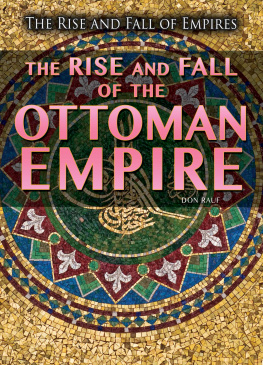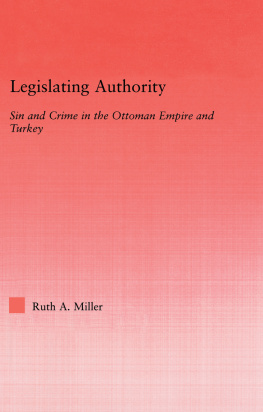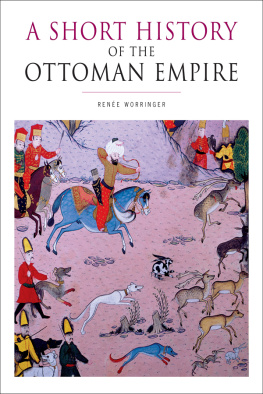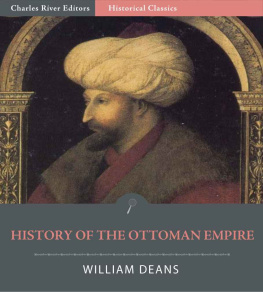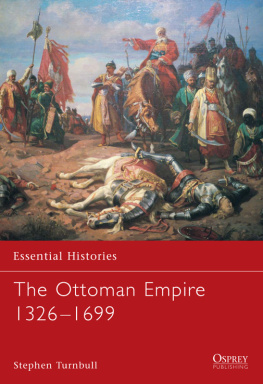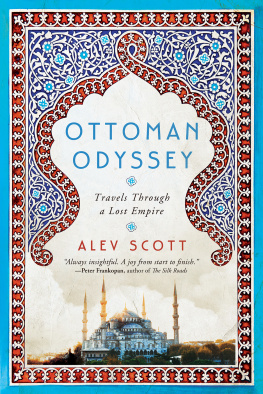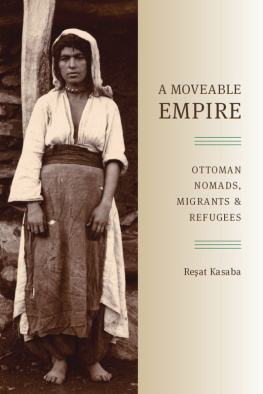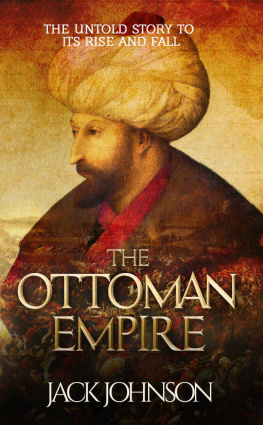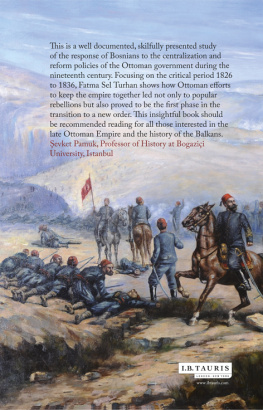THE OTTOMAN EMPIRE AND ITS SUCCESSORS 18011927
THE OTTOMAN EMPIRE AND ITS SUCCESSORS
18011927
WILLIAM MILLER
being a revised and enlarged edition of
THE OTTOMAN EMPIRE
18011913
Who doubts but the Grecian Christians, Descendants of the ancient Possessors of that Country, may justly cast off the Turkish yoke which they have so long groaned under whenever they have an opportunity to do it?
LOCKE, Of Civil Government.
This impression first published by
Frank Cass & Co. Ltd.,
This edition published by Routledge - 2012
2 Park Square, Milton Park, Abingdon,Oxon, OX14 4RN
711 Third Avenue, New York, NY 10017
Routledge is an imprint of the Taylor & Francis Group, an informa business
First Edition | 1913 |
Second Edition | 1923 |
Third Edition | 1927 |
New Impression | 1966 |
Transferred to Digital Printing 2005
ISBN: 978-0-714-61974-3 (hbk)
ISBN: 978-1-136-26046-9 (ebk)
General Preface
The aim of this series is to sketch the history of Modern Europe, with that of its chief colonies and conquests, from about the end of the fifteenth century down to the present time. In one or two cases the story commences at an earlier date: in the case of the colonies it generally begins later. The histories of the different countries are described, as a rule, separately; for it is believed that, except in epochs like that of the French Revolution and Napoleon I, the connection of events will thus be better understood and the continuity of historical development more clearly displayed.
The series is intended for the use of all persons anxious to understand the nature of existing political conditions. The roots of the present lie deep in the past; and the real significance of contemporary events cannot be grasped unless the historical causes which have led to them are known. The plan adopted makes it possible to treat the history of the last four centuries in considerable detail, and to embody the most important results of modern research. It is hoped therefore that the series will be useful not only to beginners but to students who have already acquired some general knowledge of European History. For those who wish to carry their studies further, the bibliography appended to each volume will act as a guide to original sources of information and works of a more special character.
Considerable attention is paid to political geography; and each volume is furnished with such maps and plans as may be requisite for the illustration of the text.
G. W. PROTHERO.
Preface to the Second Edition
T HE present work has been based, wherever possible, upon the original documents, and is the result of many years study of the Eastern Question. I am indebted to the editors of The English Historical and The Westminster Reviews for permission to reprint with considerable additions two articles contributed to those periodicals; and I desire to thank H. E. M. J. Genndios, former Greek Minister in London, for access to his unrivalled collection of pamphlets, and Cav. Pasqualucci, librarian of the Consulta, for his courtesy in allowing me to use the library of the Italian Foreign Office.
With regard to the spelling of Greek names, while common words have been written in their popular, unaccented form, rarer words have been reproduced in Greek dress with their accents. Slav names have been transliterated.
W. M.
ROME,
July 22, 1922.
Preface to the Third Edition
T HE additional pages of the third edition, so far as Greece is concerned, are largely the work of an eye-witness; for, resident in Athens since November, 1923, I have been a spectator of all the political movements connected with the creation of the Hellenic Republic.
W. M.
ATHENS,
July, 1927.
Editorial Note
The later relations of Turkey and other Powers with Egypt are not included in this work, having been discussed in another volume of this series, The Colonization of Africa.
Chapter I
The Ottoman Empire at the Dawn of the Nineteenth Century
THE near eastern question may be defined as the problem of filling up the vacuum created by the gradual disappearance of the Turkish empire from Europe. Its history, therefore, may be said to begin at the moment when that empire, having attained its zenith, commenced to decline. The European dominions of Turkey reached their greatest extent in the latter half of the seventeenth century, when the great Greek island of Crete, as the modern Hellenes love to call it, at last surrendered to the Turkish forces, and the king of Poland ceded Podolia to the Sultan. But the close of that same century witnessed the shrinkage of the Turkish frontiers. The peace of Karlovitz in 1699 has been justly called the first dismemberment of the Ottoman empire. It was the initial step in the historical process which has slowly but surely gone on ever since. The eighteenth century saw the continuation of the work begun at Karlovitz, though now and again the Turkish dominions gained some temporary advantage, and European statesmen anticipated the dismemberment of the Sultans European possessions and formed schemes for the partition of the spoil.
At the beginning of the nineteenth century there were only four great European Powers, instead of six, directly interested in the eastern question, for Italy was not yet made and Prussia was only of the second rank, while Venice had ceased to exist. Of these fourFrance, Russia, Austria, and Great Britainthe first had been for centuries the traditional ally of the Sultans. Francis I, who had begun his reign by proposing, as so many sovereigns have done since, the partition of Turkey, was the founder of this alliance, which, with occasional intervals of anti-Turkish feeling, was the fixed policy of his successors. In spite of the scandal caused to devout Catholics by this union of France, the eldest daughter of the Church, with the head of the infidel Turks, Francis found it politic to use Suleyman the Magnificent as an ally in his struggle with the house of Austria, the historic rival of the French monarchy. The power and geographical position of Turkey at that period, its naval forces and the requirements of French trade in the Levant, were all strong arguments, which outweighed any crusading instincts of the astute French king, just as in our own day we have seen the German Emperor champion the Turkish cause in the interests of German commerce. Together the French and Ottoman fleets bombarded Nice, while Toulon served as the Turkish base of operations. By the capitulations of 1535, which were the most practical result of the Franco-Turkish alliance, the French received permission to trade in all the Ottoman portsa privilege conceded to the vessels of other nations only on condition of flying the French flag. French subjects, residing in Turkey, were permitted the free exercise of their religion, and the custody of the Holy Places was entrusted to French Catholics. Henry II carried on the friendly policy of his father, and concluded a treaty with Suleyman, the object of which was to secure the co-operation of the Turkish fleet against the house of Austria. For a time the alliance ceased to be aggressive, but at the beginning of the seventeenth century French influence was predominant at Constantinople. The capitulations were renewed in 1604; and all nations except the English and the Venetians were compelled to seek the protection, and trade under the flag, of France in the Levant. But the capitulations of 1604 mark in this respect a change from those of 1535. France now had powerful rivals in the east; England, Venice, and Holland exercised a competing influence on the Bosphorus; and in 1634 the Greeks assumed the custody of the Holy Places, thus foreshadowing the conflict which two centuries later led to the Crimean war. The French began to turn against the Turks; the plan of a new crusade was drawn up by a French priest; a sure means of destroying the Ottoman empire was published by a French diplomatist. At the battle of St Gothard in 1664, French troops assisted the Austrians to beat the Turks; during the siege of Candia French men-of-war brought aid to the Venetians, and the memory of the French commander, the due de Beaufort, has still lingered outside the walls of that town. In fact, Louis XIV, though he tried to prevent Sobieski from saving Vienna, was hostile to the Turkish empire. His fleets entered the Dardanelles, and he obtained in 1673 new capitulations, recognising him as the sole protector of the eastern Catholics.





